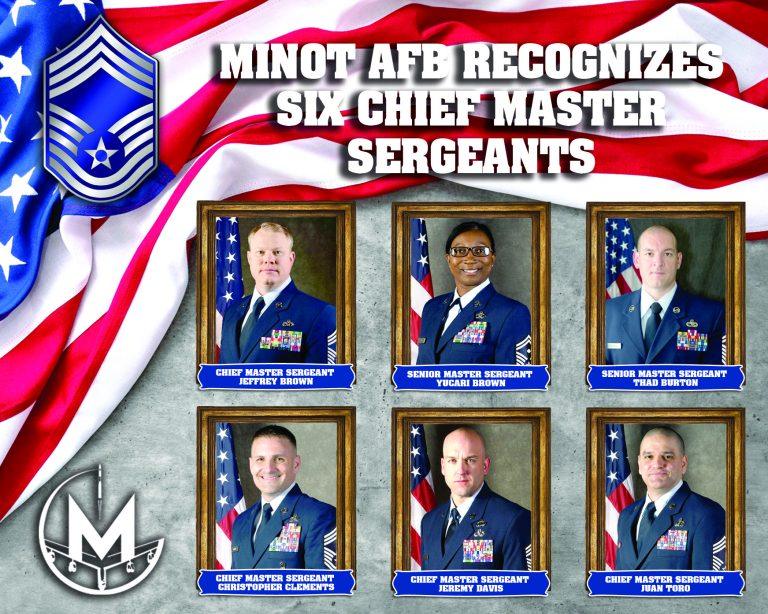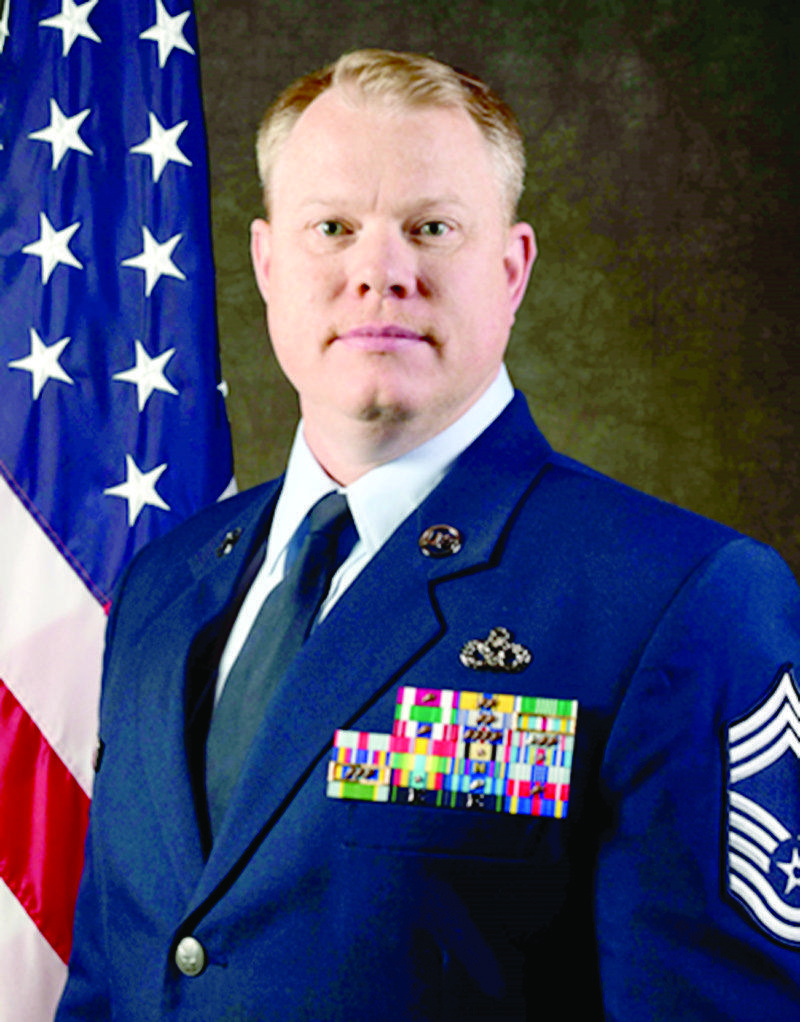
5th Civil Engineer Squadron
CMSgt. Jeffrey Brown,
5th Civil Engineer Squadron
“Back when I was 16 or 17, I had decided that I really wanted to enlist in the Air Force so I took the ASVAB. My dad was prior Army and he said he would never join the Army, so I followed in his footsteps,” said Chief Master Sgt. Jeffrey Brown. “My mom and dad were both very excited for me to enlist… to serve my country and for me to find a path, a career of my own.” As he looked back, all he felt at the time was excitement.
Brown’s career has taken him all over, and he spent time at Keesler Air Force Base, Mississippi, Ft. Leonard Wood, Missouri, Altus AFB, Oklahoma, Malmstrom AFB, Montana, Shriever AFB, Colorado, and finally Minot AFB.
He began his career as young boy, brand new, and sad to be away from home at his first assignment and now he finds himself surrounded by civilians and Airmen with a wealth of knowledge to offer. Brown is quick to give credit to the civilian work force for getting him to where he is today. One of the civilians who was most influential to him may have been 60 years old, but Brown said “he showed me how to work. I can hang my hat and tell you that is when I learned that I wanted to continue to serve and work hard.”
And when did you feel you should try to make Chief?
“For me, there was no trying. It was never about my achievement. It was about me trying to push my Airmen to the next level, and I think that Chief just kind of came naturally. It’s not about the rank. The rank is just some stripes on your sleeve. At the end of the day it’s all about who you are bringing with you.”
Brown says there was a point in his career where he gave up. He called his Mom and told her that he had made the decision that the military was not for him, and he was coming home. Her answer was really quite simple…no you’re not! She encouraged him not to give up.
“It’s too easy to find yourself in a circumstance that makes you want to give up,” reflected Brown, “but I would say to others, continue to persevere.”
Brown feels that keeping his family together during his years in the Air Force was an accomplishment. He is married to his spouse Suzanne, and they have a son Andrew who is 20 and daughter Aubrey who graduates this year.
“I’ve been married to my wife for over 20 years, and I have been able to be there for my family, that was huge. Through all of the seven deployments and numerous TDYs, I still have my perspective that the Air Force is good, but the family is where it is at.”
When asked about similar challenges today versus when he was a young Airman, Brown said he still has a hard time being in the spotlight. “Here I am today in this interview and I am struggling. The struggles are still the same, it doesn’t change.”
But, he is able to overcome adversity by focusing on the positive qualities that helped him get to where he is today. “It’s important to focus on learning who you are… a lot of self-reflection and gaining that confidence.” Being in the “light” is something that Brown has gotten more comfortable with over the years.
What are your expectations for yourself moving forward?
“My number one expectation is to train the next generation and to provide them with the wisdom that I have been given over the years by great leadership. Even through bad leadership, you get to know the trials and tribulations. That’s what I’m here to do, to make sure that they the next generation of Airmen are ready for anything.”
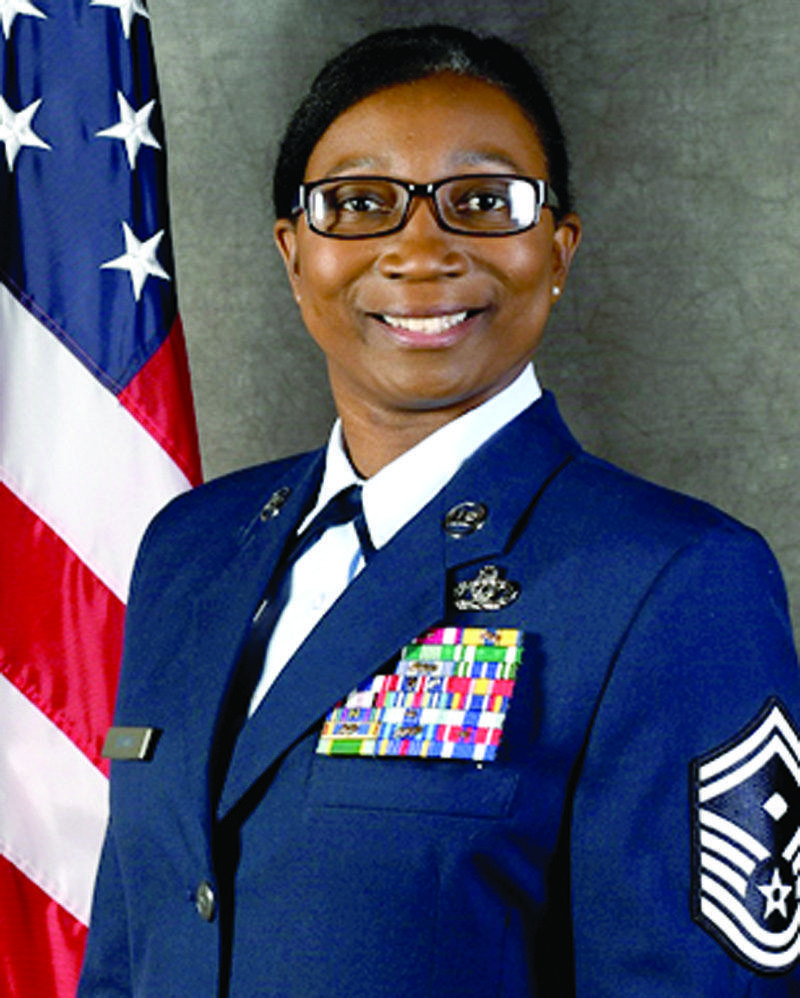
5th Security Forces Squadron
(CMSgt. Select)
SMSgt. Yucari Brown,
5th Security Forces Squadron (CMSgt. Select)
For Senior Master Sgt. Yucari Brown, her aunt and uncle influenced her decision to join the Air Force, along with an uncle who served in Vietnam. She realized that her calling was to a lifestyle that could provide a secure living for herself and her daughter, a calling that would take her all the way to Chief Master Sgt.
“I started at Seymour Johnson in North Carolina, went from Seymour to Shaw AFB, North Carolina, from Shaw to Joint Base Elmendorf-Richardson, Alaska, and from JBER to Minot. I’ve been in cold over half of my career,” she said with a smile. “Almost 15 years in the cold.”
Throughout her career, Brown has faced unique challenges as an African American woman in a male-dominated career field. “Until recently, seeing a female Chief in my career field was not a common thing,” according to Brown. “I remember seeing female Chiefs in other career fields, but not necessarily my own.”
Along the way, several people helped her to succeed. “The first is God,” she said. “But I compare this career field to a branch. There are several leaves attached to this branch, and then one day one of the leaves will fall off. My civilian mentor was monumental at a point in time in my career when I was struggling with whether or not I was going to stay in the military,” shared Brown. When she had gotten orders to Alaska, she said “I remember thinking that I’m not taking these orders. I’m not going to Alaska, but it turned out to be one of my better assignments.” According to Brown, there have been several people both military and civilian who have helped her along. “What I learned early is that you are the CEO of your life and you need to determine who you are going to allow to sit at the table and feed into you. There’s a change and rotation at the table because I started to progress further and further along; there are different people for different seasons.”
Chief Rita Felton was the person most influential in helping Yucari to decide to set her goal to be a Chief. “She was my First Sergeant when I was in Alaska. There were always points in my career when I wanted to go do something else, I thought about leaving…and when I got to my 10-year mark I thought that at any point in time I can still jump.” But when Brown met Rita, she was the first Noncommissioned Officer that she had interacted with. “I enjoyed having conversations with her, and she was a ball of energy every time I met her. You never saw her down or depressed or upset about anything, she was phenomenal.”
So, what expectations does CMSgt. Select Yucari Brown have for herself from here on out?
“A lot. It’s kind of overwhelming when you start progressing. You hear the numbers, like you’re one of 500, or one of 1,000, and you get down to your career field and can be one of four. You start to realize that there are people depending on you to get in a position to help them later, to give them knowledge and information and to give them leadership. Then you start to say, ‘did I really learn enough for this season in my life or should I be learning more?’ I may say to myself, ‘should I pick up this leadership book because I may be a great manager, but my struggles are with leadership.’ Now the spotlight is on you without you realizing it. When you get to a certain rank you realize, I made it, but now it’s just the beginning. Now it’s a whole new level of professionalism, and a whole new level of education, and a whole new level of expectations that I know I want to be able to stand up to when I put that stripe on.”
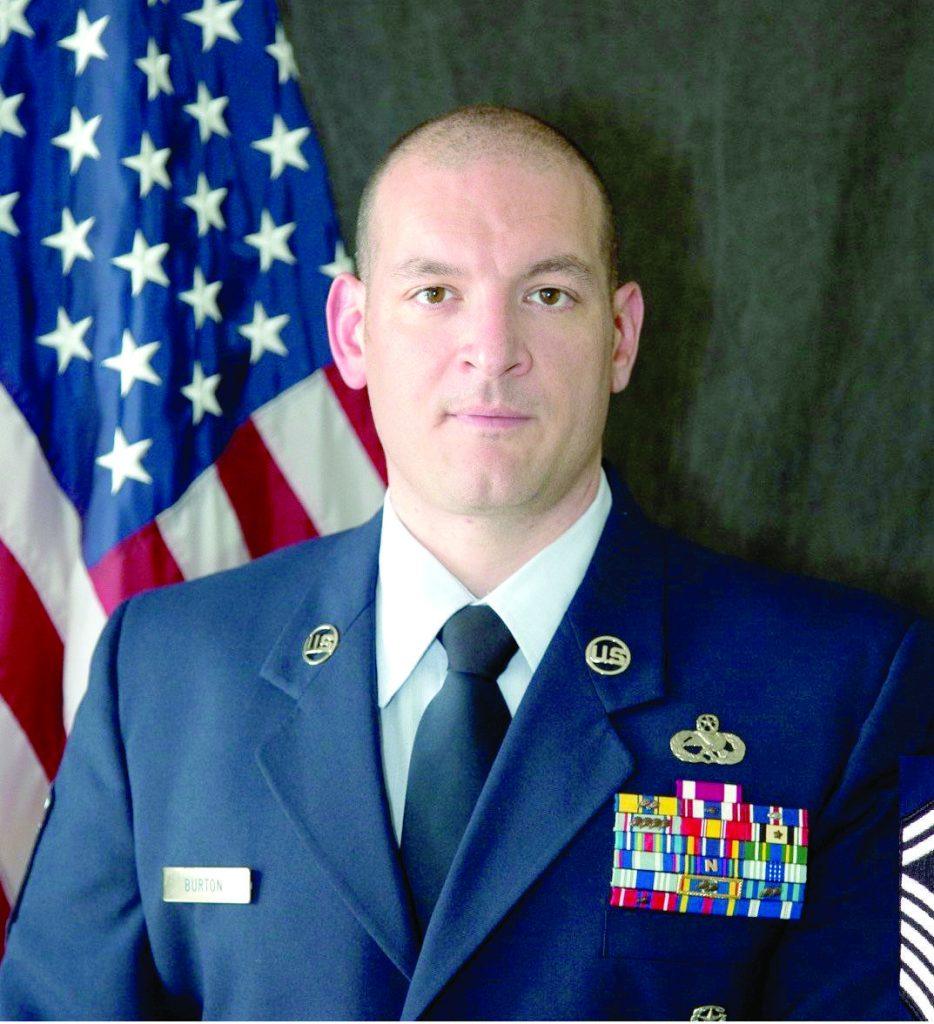
5th Munitions Squadron (CMSgt. Select)
SMSgt. Thad Burton,
5th Munitions Squadron (CMSgt. Select)
For Senior Master Sgt. Thad Burton, his journey to Chief began the day after he graduated from high school. Basic training for Burton was a bit longer than most because his appendix burst. After surviving that ordeal and completing basic, he attended tech school and went to his first assignment. “I got a lot of experience and there were a lot of job opportunities there. They taught me to work hard,” said Burton. As a Senior Airman, he was sent to Aviano Air Base, Italy, and then Shaw Air Force Base, South Carolina after. Overall, he spent about 15 years working on F-16 crews. Orders to Korea came next, although he had to leave his family behind in SC. There was a stop in Kadena, Japan, and finally he landed at Minot Air Force Base. “Even though a lot of people wouldn’t have been excited to be in Minot, Minot has been good to me. It’s been good for me professionally and personally,” he said. His spouse also works for the base as the Community Childcare Coordinator for the 5th Force Support Squadron.
Burton and his wife Janelle have been married since 2005. He explained, “We got married in Italy, two weeks before I deployed to Iraq for six months. She has been a constant support for me. Whether it’s TDYs I’ve gone on, or the long hours at work, she’s always been there and always been very understanding. I don’t have to worry about the home front when I go somewhere. It takes a lot of work, but she was always there making sure that I was doing the right thing. We’re a great team, and we work well together.”
According to Burton, making the rank of Chief Master Sgt. means “continued service to our country, to our members, and giving back to all of the individuals who helped get you there. No one does this alone. You can’t be a lone wolf and make any rank, let alone Chief. You have to have the support of your members, your supervision, your commanders; you have to have people guiding you and giving you directions, telling you what you are good at, what you are bad at, and what you need to improve on…”
Now that he has reached the top enlisted rank, Burton has the time to focus on his Airmen and ensure that they are well taken care of.
Did You Want Chief Master Sergeant?
“Well, whether I wanted Chief Master Sergeant… depends on what year you are talking about. If you had been talking to Airman Burton, no. I think Staff Sgt., Tech Sgt. and even Master Sgt. Burton would have said, ‘well maybe.” But like many others who have made Chief, his change of heart came when he realized the difference that the rank could make. “I wanted to continue to serve and do the most I could for the Air Force. You need to give back, and I felt I could do that at a higher level.”
And what are your expectations now that you are going to become a Chief?
“I want so to serve for as long as I can, and I want to do as much good as I can for the Air Force, whatever I can do to improve the way we do business. I want to make whatever I am doing better.”
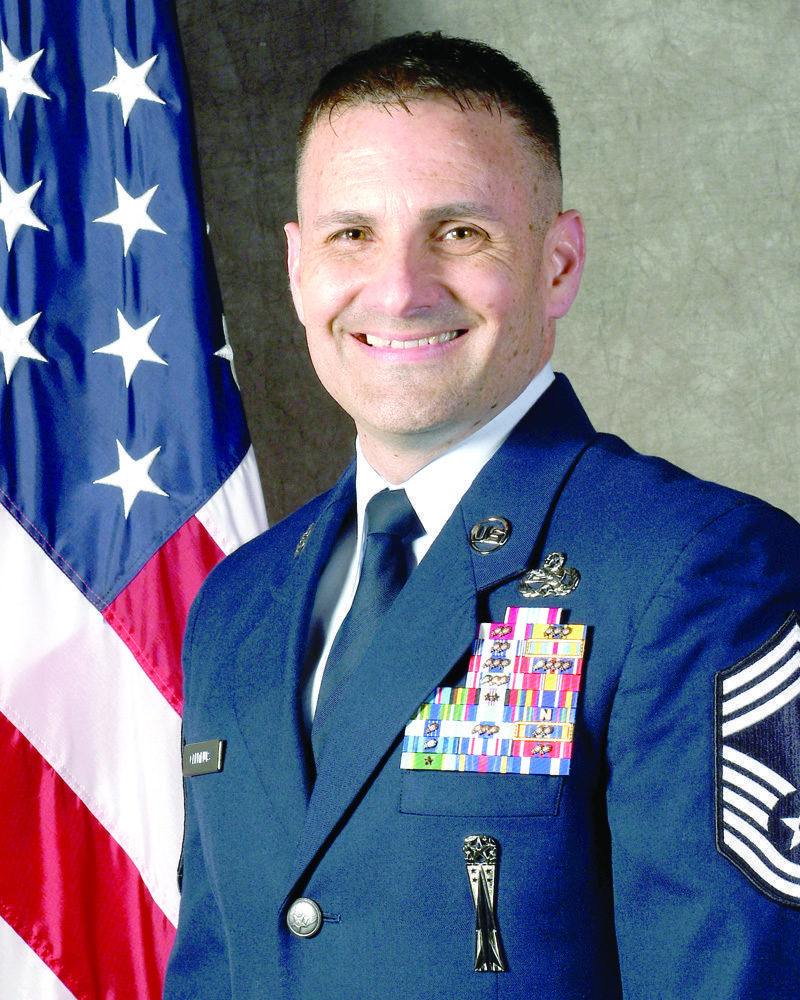
5th Maintenance Group
CMSgt. Christopher Clements,
5th Maintenance Group
Chief Master Sgt. Christopher Clements has been in the Air Force for 25 years. His wife, Danielle was in the Air Force for seven years as a weapons loader. Both Christopher and Danielle see the highlight of their careers as being able to serve in a deployed location.
As with any military family, there are the challenges of TDY and deployments. 30 days after getting married, the Clements family PCSd to Europe. He noted one of the different aspects about living overseas, saying “you are driving on the wrong side of the road, on the wrong side of the vehicle. [Danielle] did not know how to drive a stick, so she had to teach herself.” Their time at RAF Lakenheath would include a TDY for Clements. “After that I was out the door to Afghanistan for another four months, so yeah, there were certainly hardships. I also had a son from a previous marriage, and [Danielle] had to figure out how to take care of him while I was gone.”
Now that Clements has overcome his previous challenges and made Chief, he continues to support those who he takes charge in leading. He sees the challenges for today’s Airmen and is always ready to help them and give them advice. “I take the time to talk with them and offer my experiences. I tell them the specific ways that I have messed things up throughout my career—and the list is long, trust me—just to be able to relate to Airmen that these mistakes doesn’t have to define you, doesn’t have to get you down. At the end of the day, we are all humans and we’re all going to make mistakes, but how you recover from that is key, and that is what is going to separate you from the rest.”
Hardships are a part of the game, according to Clements. “There were several times when I could have hung it up and said this is too much, but I made a promise to myself over the years. I will retire, I will step away from the Air Force when I’m not having any fun, and well I’m still here, still having a great time and hopefully still making an impact on Airmen.”
Was there that one person that you can point to that changed your career?
“Well, I don’t think there is that one person that I can point to over the years. When I promoted a couple of months ago, I named off a list of over 30 or so individuals and personal mentors of mine over the years who were very influential for me and helped me grow. When you move around a lot, as we do, it’s hard to hang onto that one person. Luckily, I was able to have several mentors and each one had a little different take on things.”
And in the years ahead, what are your goals?
“Well one of my goals, and probably the goal in the Air Force, is to be the Wing Weapons Manager. That’s been a goal of mine, and the pinnacle of my career. You set new goals as you go. You never stop, you never say, ‘hey I’ve arrived.’ You say, ‘what impacts can I have in the position that I am in to either help Airmen or help the mission?’”
Do you have any advice for new Airmen arriving in Minot?
“Make the best of your time when you are here, because there is plenty to do. Try different things. Have a good time, get the job done, and then move on and do the next thing.”
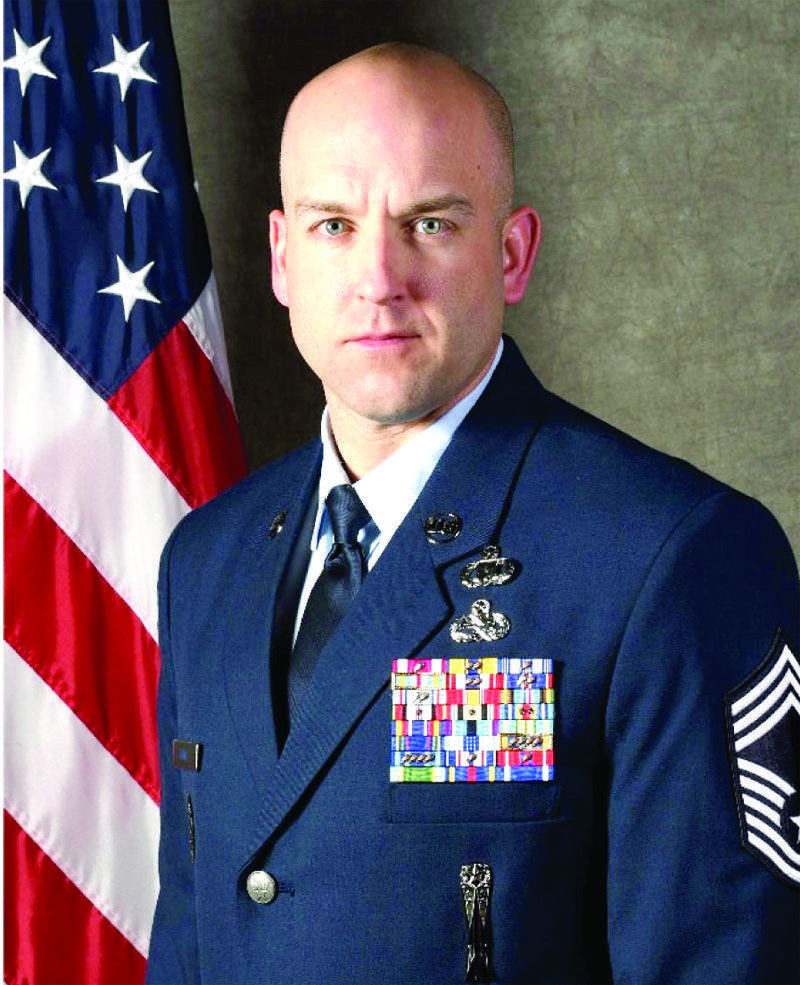
5th Munitions Squadron
CMSgt. Jeremy Davis,
5th Munitions Squadron
For Chief Master Sgt. Jeremy Davis, his family has a legacy of service to their country through the Air Force, so it was natural that he would follow in their footsteps. “It’s a family history, my grandfather entered the Air Force in 1950 and retired a Chief, my father entered the Air Force in 1979, he retired as a Fire Chief, it was what I knew,” Davis shared. “So the choice was pretty easy.”
Davis was only a senior in high school when he enlisted. He knew it was the best choice, and so when he graduated he was ready to go.
Along the journey to Chief, Davis said that there were challenges, the first being a First Sergeant as he took a step out of his career field. “In the First Sergeant role you have to adapt quickly. You are way out of your comfort zone,” he said. He also faced 13 deployments over the course of his career.
He describes himself as an “ammo guy” who, in his First Sergeant role, was brought over to the cyber world. “They value things differently than I did as an ammo troop,” according to Davis, “but it helped a lot because it rounded out my leadership style.” He learned quickly what the other side of the house values, and in turn he is now able to convey those values to those he is leading.
As Davis looked back at his career, he was quick to point out the ones who inspired him along the way. “First is God. I thank him every day that I am allowed to wear this uniform. My wife Rachael has helped me out a lot, and definitely my dad. He’s been my sounding board. It’s amazing that we talk about leadership and management and it’s interesting that I can have those conversations with my dad.” And then there are the thousands of other mentors, the Airmen he has led, that Davis has learned from as well. “It’s interesting what you can pick up. It’s been a multitude of individuals and quite diverse ones, too. All the folks who are out there that have helped me out, they know who they are. When the word got out that I had made Chief, it was emails and texts, and I was just so humbled. I tried to circle back and thank them for everything they had done…it’s a team effort to become a Chief, I’ll tell you that right now,” said Davis.
Davis’s father offered him valuable advice along his journey. “It was along the lines of ‘don’t mess it up.’ Every day he told me that I have to earn it every day, especially when I made Chief. I think that rings in my ears once or twice a day; am I earning it? Am I giving back to the folks I am charged with?” His dad also reminds him every day that he volunteered to be where he is. Davis has been retirement eligible since 2018, but he still enjoys what he is doing. “I am definitely getting up every morning and telling myself that I better earn it.”
Even though Davis describes his time as a First Sergeant as difficult, it did not damper or sway his determination to be a Chief. “I knew from the first day that I wanted to be a Chief, I wanted to be just like my dad and grandfather.” Even when things did not quite go as planned, his spouse and father would not let him feel sorry for himself. He said, “I told myself to get back after it.” Davis is married, and he and his spouse, Rachael, and his children Bailey, Logan and daughter Laikin.
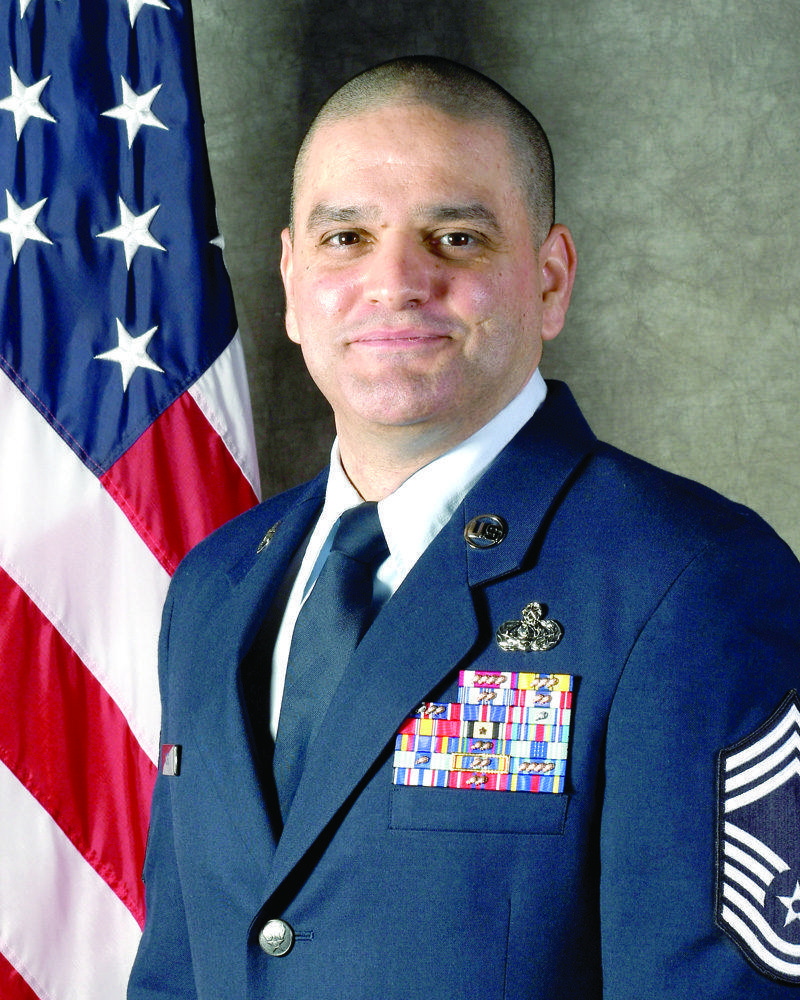
5th Communications Squadron
CMSgt. Juan Toro,
5th Communications Squadron
Chief Master Sgt. Toro did not originally have any initial plans to enlist in the military. “The Air Force and the military weren’t on my radar, but I was in high school, and I had a friend of mine who was already all in and the recruiter at the time had monthly commander’s calls with the guys who were waiting to get shipped out. The recruiting office was about 45 minutes from my house, and it happened to be in one of the bigger cities in Puerto Rico, so my friend asked me if I wanted to go with him. Sitting in the commander’s call got me interested. I walked out thinking that might be an option and a few months later I signed up,” remembered Toro. “My mother had to sign me up because I was only 17. She signed that paperwork and a few months later I was at Lackland.”
After Lackland Air Force Base, Texas, Toro’s first assignment was at Ramstein Air Base, Germany. “I was assigned to the 86th Communications Squadron; I was basically a phone guy for the Air Force,” he laughed.
For Toro, the pressure of thinking he needed to have his life figured out was very real. His supervisor, Staff Sgt. Love, had a big influence in Toro’s Air Force career. “He was the first one to really sit down with me and explain to me that I was at a crossroads, but it was okay to not know what I wanted to do in life, just do the best that I can. To be honest, I would give the same advice to a young Airmen today. If it’s not broke, don’t fix it. It’s okay to make mistakes, just pick yourself up and learn from those mistakes and make sure not to make them again.”
Toro’s Air Force journey would take him next to McConnell Air Force base in Kansas. “I’m a big believer in fate,” said Toro, “because Kansas is where I ended up meeting my spouse, who was also an Airman. We started our family, our son was born there, and we finished off our five years in Kansas.” A PCS would then take the Toro family to RAF Mildenhall in the United Kingdom, where a daughter was born. Offutt Air Force Base, Nebraska, would be the next stop. Three years later, as fate would have it, a 15-month unaccompanied tour to Incirlik Air Base in Turkey would become a two-year tour for both Toro and his wife, and they were able to keep the family together. From there he headed to Sheppard AFB in Texas, to Travis AFB in California for three and a half years, and then finally to Minot AFB.
What Are Some of The Challenges You Have Had In Your Career?
“I’ve been deployed three times, and I can say that the first one is always hard. It’s your first time away from family. [My wife and I] had been married for a little over two years and my son had been born just before that. It doesn’t make any difference how long the deployment is, being away from family is being away from family. The job was hard, but in its own way it was fun. I definitely grew a lot, even though it was a very basic deployment… living in tents, having cots for beds. So, the biggest challenge was deployment. Some of them are going to be good and some of them are going to be challenging. But you’ve got to remember that they’re not forever. And we’re trained so that when that call comes in, you go out and do what you gotta do.”

